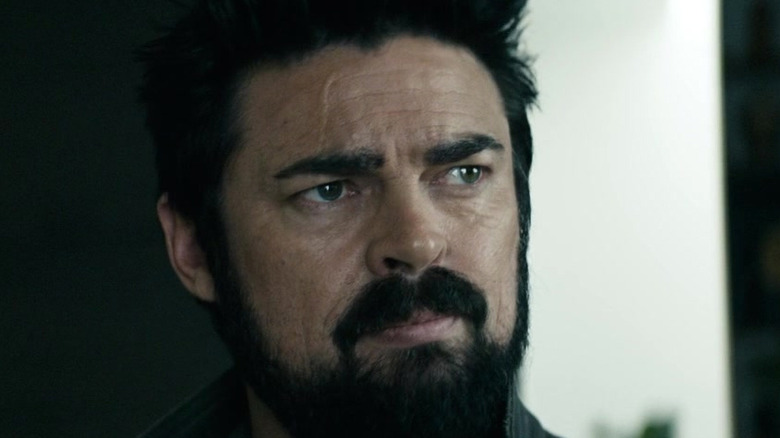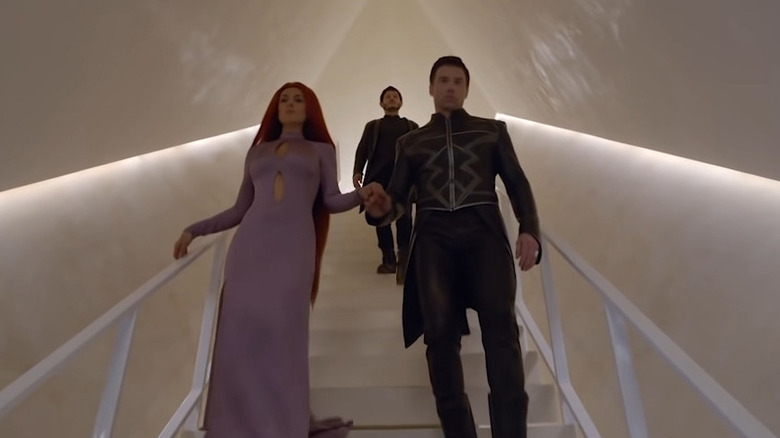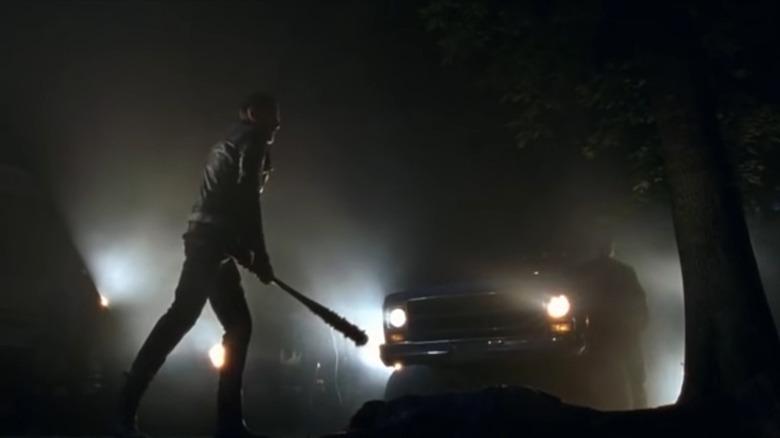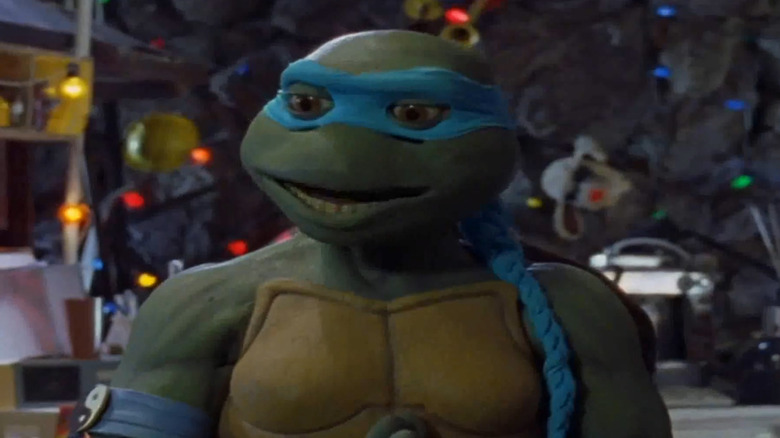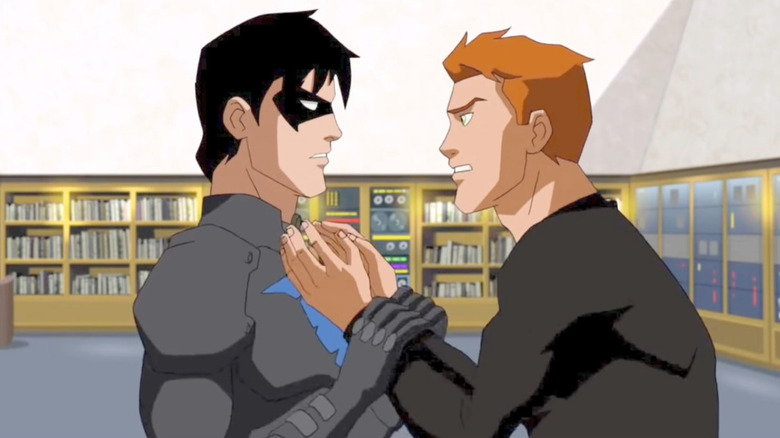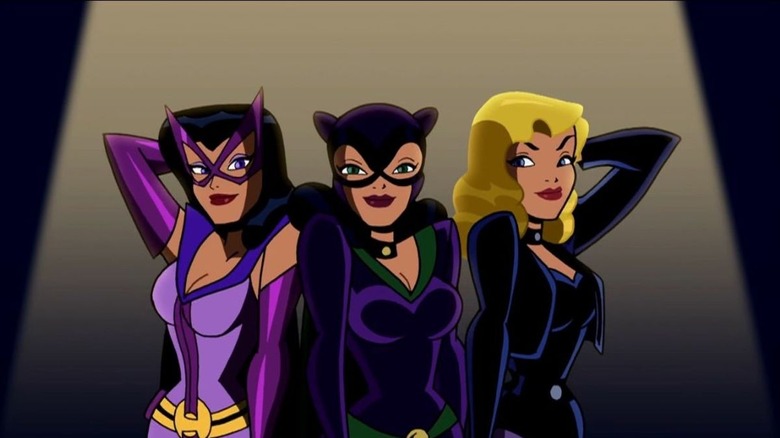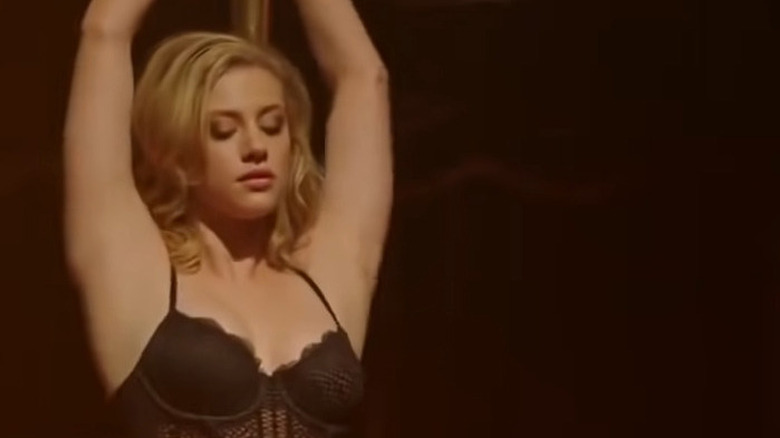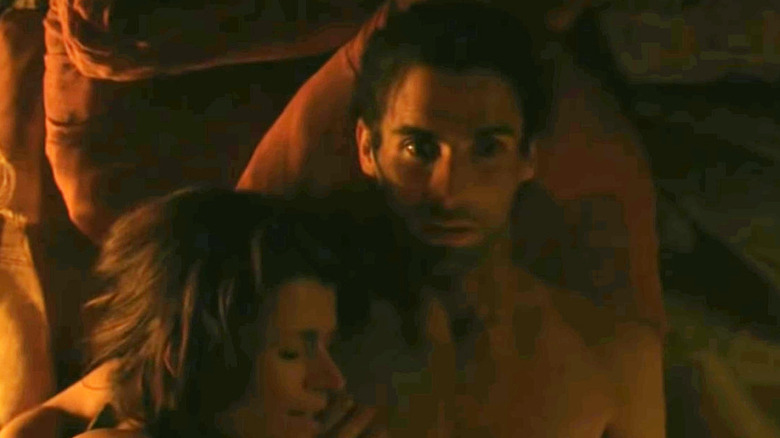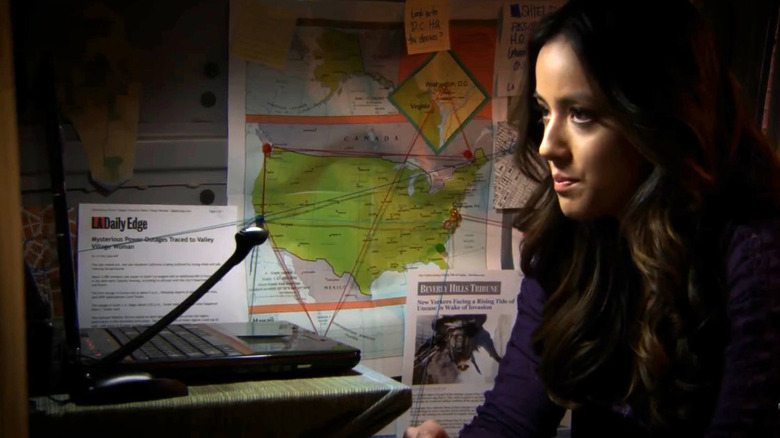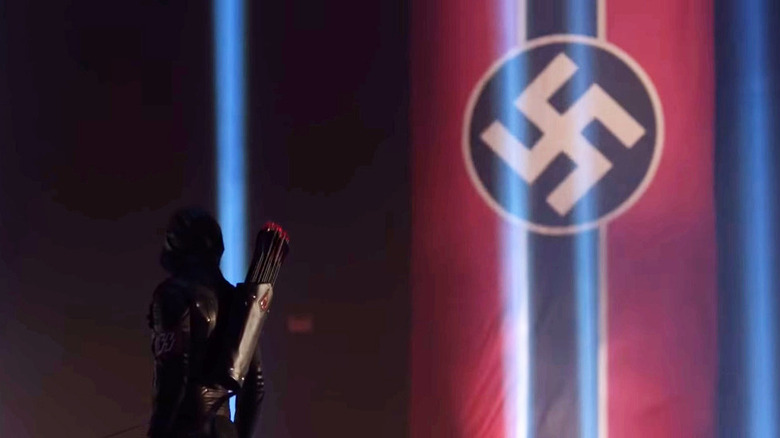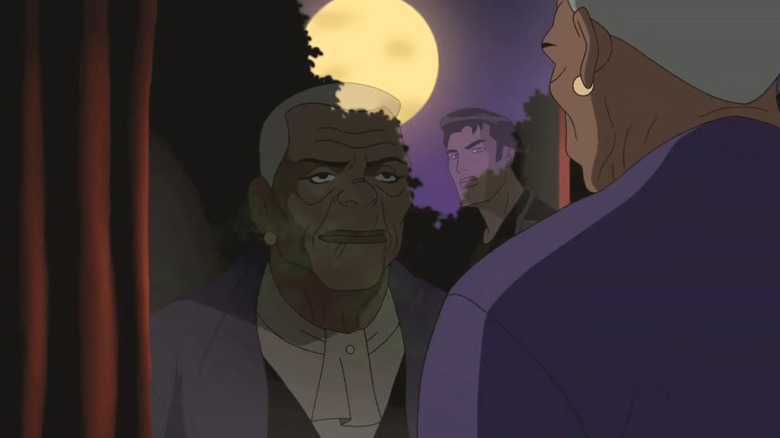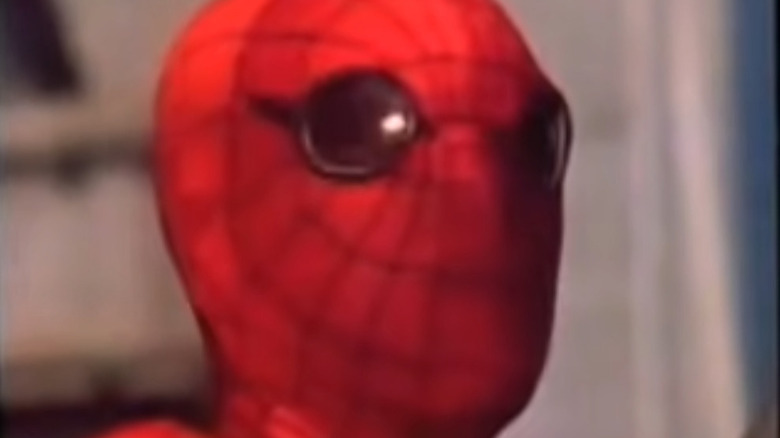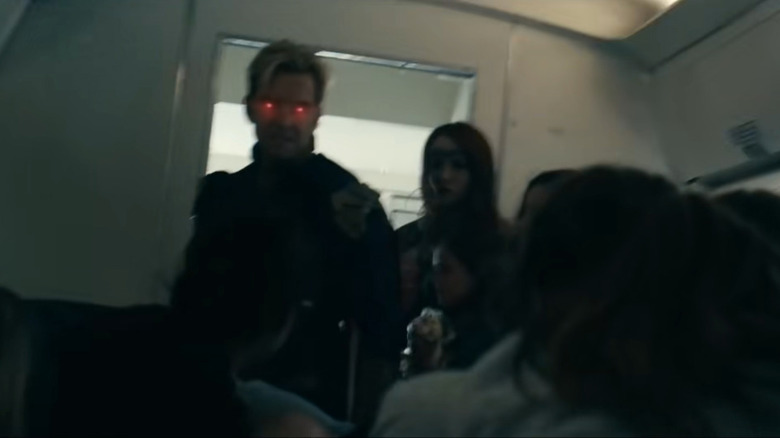Comic Book TV Series That Went Too Far
One might think that putting together a TV show based on a comic book would be a cakewalk. Since the source material already exists, adapting it shouldn't be that difficult, right? Take "Watchmen," for instance. For years, many claimed that the seminal work was "unfilmable" (via The Independent). Yet Hollywood has made both a cinematic adaptation and a TV show set years after the events of the 12-issue miniseries.
The work that creative teams put into crafting these TV series is no joke, however. Adapting a comic book for the small screen involves a delicate balancing act: The show needs to pay respect to its illustrated roots, but must also avoid becoming a mere retread of everything fans have already seen. In so doing, writers, producers, and directors inevitably find themselves taking risks. Many end up working, but on some occasions, creators end up crossing the boundaries of what's acceptable for the audience, the story, and even the medium itself. From undesirable character changes to questionable storytelling choices, these are the comic book TV series that went too far.
Inhumans introduces eugenics and a caste system to the MCU
There's a long list of reasons why Marvel's "Inhumans" didn't meet expectations. This is a real shame, as the Inhumans are a pretty neat part of the Marvel universe, and were originally slated to make quite a splash in the MCU (via The Hollywood Reporter). It's worth noting that during this time, Marvel Studios didn't yet have the rights to the X-Men. The Inhumans were likely meant to take the place of Marvel's mutants in the MCU pantheon. Sadly, their live-action foray experienced a Terrigenesis of its own, transforming it from a potential blockbuster film into an ABC TV show (via Gizmodo) that got canned after one season.
From its incredibly tight production schedule (via CNet) to its less-than-inspiring promotional material, it truly seemed like "Inhumans" was doomed to fail from the start. However, the series' fatal flaw may lie at its core: Its heroes are simply way too unpleasant to empathize with, much less cheer on. The privileged protagonists of "Inhumans" rule over a society built on a rigid caste system and outright slavery. The Inhumans also practice selective breeding, otherwise known as eugenics. Add in a punishing lack of personality, and you have a recipe for commercial disaster.
The Walking Dead brutally kills off Abraham and Glenn
Readers of "The Walking Dead" always knew that at some point, the hit TV series would adapt one of the goriest, most controversial moments of the comics: The brutal death of fan-favorite character Glenn, at the hands (and barbed bat) of the villainous Negan. Indeed, the dreaded moment comes right at the beginning of Season 7. It's set up by the previous season's finale, via its heart-stopping introduction of Negan, his weapon Lucille, and his band of brazen ravagers, the Saviors.
However, the show takes a slightly different (and significantly bloodier) route to this moment by offing not one, but two characters. Initially, Abraham has a face-to-face meeting Lucille's business end. Then, Daryl's display of rage prompts Negan to pick Glenn as his second victim. Thus, the series stays true to the source material, but only after adding even more bloodshed to the moment.
Even Michael Cudlitz, the actor who played Abraham, believes the show veered too deeply into darkness in this scene. "I always think it was a bridge too far, personally," Cudlitz commented on Skybound's "Talk Dead to Me" podcast. "I thought it was too much. Either one of us should have lived a little bit longer ... people were very affected by it."
Ninja Turtles: The Next Mutation introduces the fifth turtle, Venus de Milo
Ask any fan of the Teenage Mutant Ninja Turtles to name the members of the world's most fearsome fighting team, and they won't break a sweat listing Master Splinter's students: Leonardo, Michelangelo, Donatello, and Raphael. For at least two years of real-world time, though, the TMNT had a fifth Turtle in their ranks. 1997's "Ninja Turtles: The Next Mutation," which aired from 1997 to 1998, boasts a female mystic who isn't named after a Renaissance artist.
According to the show, Venus de Milo was right beside the unmutated turtles in the sewer when they were exposed to the ooze that transformed them. Unlike the TMNT, however, she was found by a Shinobi master named Chung I who proceeded to raise her in the mystic arts for 18 years. Upon her return to New York, she joins the TMNT, donning a light blue bandana and complementing the brothers' ninja training with her magical skills.
Unfortunately, Venus failed to resonate with fans ... and even the creators themselves. The backlash was so strong, "Teenage Mutant Ninja Turtles" comics of the time occasionally featured the slogan "No girl turtle guaranteed" on their cover. "TMNT" co-creator Peter Laird hates her so immensely, he called her "creatively bankrupt" and "execrable" in a 2012 blog entry, and allegedly banned the character from further cinematic adaptations of the franchise (via The Atlantic).
Young Justice makes Nightwing manipulative
Despite learning most of what he knows about superheroics from Batman, Dick Grayson, aka Nightwing, is vastly different from his caped mentor. To most of the heroes (and villains) of the DC universe, the Dark Knight is a brooding loner who operates according to his own plans. In stark contrast, Nightwing is the kind of guy everyone is willing to trust and follow, even if their own abilities surpass his.
This is why some of Nightwing's actions in "Young Justice" seem wildly out of character. In Season 2, the series fast-tracks Dick's transition from Robin to Nightwing via a five-year time skip. As the new leader of the team, Nightwing comes up with a plan to defeat the villainous Light with some good old-fashioned espionage. Part of this plot involves having the team's former leader, Aqualad, pretend to betray them and defect to the bad guys' side, while faking the murder of fellow teen hero Artemis. There's only one problem: The rest of the team isn't aware that this is a fake-out, leading them — particularly Kid Flash, Artemis' boyfriend — to become furious at Dick when his deception is revealed.
Batman: The Brave and the Bold incorporates some outrageous innuendo
Most modern Batman media portrays the character as dark and serious. "Batman: The Brave and the Bold," which aired from 2008 to 2011, departs from this trend by embracing the silly, campy fun of Batman's midcentury incarnations. This makes it ideal for a younger demographic ... and also for slipping in gags that fly straight over kids' heads.
The best, most notorious example of this is the Season 2 episode "The Mask of Matches Malone!" While it's largely a fun and straightforward one-off, like most of the series' episodes, it also features Black Canary, Catwoman, and Huntress performing an innuendo-filled song at a club full of hooligans. Huntress bemoans the fact that the Flash is sometimes "just too fast," and mischievously notes that Aquaman's "little fish" is "less outrageous" than his heroic deeds. Catwoman implies Green Arrow isn't always "shooting straight," which Black Canary takes offense to. The trio wraps things up by devoting three whole lines to admiring Batman's batarang, and expressing their desire to see his "secret cave." Needless to say, it's not very child-friendly.
Riverdale makes Archie Comics R-rated
As anyone who has watched an episode of The CW's "Riverdale" can attest, this show ain't your father's Archie. Part thriller, part teen drama, and part soap opera, "Riverdale" sees Archie Comics' beloved characters tackle problems far more severe than Archie's fraught choice of date or Jughead's insatiable appetite. While the comics have admittedly grown up in recent years (via Vox), the TV show turns the maturity level up to 11 — especially in terms of sexual content.
In Season 2's "Chapter Twenty-One: House of the Devil," Jughead's father F.P. Jones celebrates his retirement at the Whyte Wyrm. There, an entire audience of thugs and gangsters is treated to a sexy striptease, performed on stage by a lingerie-clad Betty Cooper. Yes, you read that right: The beloved high school student best known for her blonde ponytail and tomboyish personality strips for a bunch of adults while she sings Tears for Fears' "Mad World."
Then there's the steamy relationship between the entirely underage Archie Andrews and his music teacher, Miss Geraldine Grundy. Revealed in the early episodes of Season 1, this relationship is played up in interviews and ads as a sexily forbidden romance. It is, of course, actually statutory rape.
Preacher takes the gospels to the bedroom
To be fair, no one tunes into an episode of AMC's "Preacher" expecting family-friendly entertainment. Based on the comic series of the same name, "Preacher" follows the adventures of Jesse Custer, a preacher gifted with the ability to verbally command others to do his bidding. While the language, themes, and level of violence present make it anything but a children's program, one Season 2 sequence still manages to ruffle some fans' feathers. This is because "Dirty Little Secret" opens with a scene depicting Jesus Christ having sex.
The nature of this sequence is attention-grabbing on its own, of course, but it's not just the content that incurred criticism. For the most part, the scene is framed in an intentionally humorous way: A cheesy song blares in the background, the couple proceeds through multiple goofy-looking positions, and Jesus leaves because he has to do something for "his dad." Catholic League president Bill Donohue called the scene "grotesque," but the series' showrunners weren't fazed by this outrage. Executive producer Seth Rogen even took to Twitter to express his glee, calling the backlash a "good endorsement" of the series.
Agents of S.H.I.E.L.D. uses a real-world name for fictional hacktivists
When ABC's "Agents of S.H.I.E.L.D." premiered in 2013, it became the highest-rated drama debut in almost four years, according to Entertainment Weekly. Aside from bringing back fan-favorite MCU character Phil Coulson, the show was also the first television series to be officially connected to the MCU. Sadly, Episode 1 also makes an unfortunate choice: It gives a mysterious group of hacktivists the same name as a real-world organization fighting for a worthy cause.
The show's premiere introduces the Rising Tide, a network of anonymous operatives seemingly bent on revealing S.H.I.E.L.D.'s secrets to the world. This would be fine, if not for the existence of Rising Tide North America, a network that focuses on climate and environmental issues. Understandably, this coincidence didn't sit well with Rising Tide North America: In a post on their now-defunct website, they clarified their mission, and criticized the show for its portrayal of "seekers of truth, justice and ecological sanity" as "evildoers" (via Wired). Additionally, the real-world Rising Tide crafted a petition to make the show drop their name and logo.
Crisis on Earth-X makes superheroes in Nazis
Since 2014, avid fans of The CW's DC universe shows have been looking forward to yearly crossover events. These multi-part story arcs feature the characters of the different series interacting with one another, usually to stop a major threat that a single protagonist or team can't handle on their own. Such is the case in 2017's major crossover, "Crisis on Earth-X," in which Green Arrow, the Flash, Supergirl, and the Legends of Tomorrow square off against their Nazi counterparts from the alternate world known as Earth-X. While it's not uncommon to see a comic book character punching the living daylights out of Hitler or his cronies, this particular take on the trope didn't sit well with some fans.
As one critic argued, a Nazi version of Supergirl is inherently "disrespectful" of the character, given the Superman family's Jewish roots. Others wondered why the showrunners decided to feature such a controversial group at all if they weren't going to truly reckon with Nazi Germany's legacy. This choice, these fans argued, cheapens the story and insults the characters. "This has the unintended consequence of minimizing the very real threat of racism and Nazi rhetoric," Bustle's Olivia Truffaut-Wong noted.
Batman Beyond ruins a boy's life to make him the next Batman
1999's "Batman Beyond" presents a bold new take on the Batman mythos. Set in the year 2039, this cartoon stars Terry McGinnis, a teen who takes on the mantle of the Bat under the guidance of an old, battle-worn Bruce Wayne. While the show eventually became popular enough to propel its lead character into DC Comics proper, six years passed before Terry's true origin was revealed to fans in an entirely different series
"Epilogue," the Season 2 finale of "Justice League Unlimited," is set many, many years in the future. Here, Terry confronts former Project Cadmus head Amanda Waller in an effort to learn why he and Bruce Wayne are genetically compatible. Waller reveals that she masterminded a secret program called Project Batman Beyond, which made Terry Bruce's genetic son: On her orders, Terry's father unknowingly received a nanobot injection that overwrote his DNA with Bruce's. Waller did this because she believes that the world will always need a Batman, and wanted to ensure that the hero's legacy would continue. She even sent the Phantasm to assassinate Terry's parents, though fortunately, the villain refused to complete the job.
While Terry eventually comes to terms with his roots and embraces his role as Gotham's protector, this doesn't erase the fact that Waller was willing to genetically and emotionally manipulate a child just to make him grow up into a vengeful vigilante.
The Amazing Spider-Man is so off the mark, even Stan Lee didn't like it
When someone brings up the idea of a live-action Spider-Man, you probably think of Tobey Maguire, Andrew Garfield, or Tom Holland. Long before they donned Spidey's tights, however, there was another attempt at portraying the wall-crawler in the flesh — one that turned out to be so fundamentally different from the source material, even Stan Lee had some not-so-nice things to say about it (via The Hollywood Reporter).
Notably, 1977's "The Amazing Spider-Man," which starred Nicholas Hammond as the titular hero, was not a flop. Yet it didn't last beyond two seasons, and largely vanished from the popular imagination. The series' deviation from the original comics, which made Stan Lee "very unhappy," might be why. "With 'Spider-Man,'" Lee recounted, "I felt the people who did the live-action series left out the very elements that made the comic book popular. They left out the humor. They left out the human interest and personality and playing up characterizations and personal problems." Apparently, fans agreed with Lee, as few remember the 1977 series with fondness.
The Boys takes mayhem to a new level
Amazon Prime's "The Boys" is probably the least surprising inclusion on a list of comic book shows that go too far. Violence and gore are staples of pretty much every episode, as the series focuses on amoral, corporate-sponsored superheroes and the ordinary people trying to stop their misdeeds. However, two scenes still manage to stand out as especially disturbing.
In Season 1, superhero hunter Billy Butcher discovers evidence that Vought International genetically engineers "supers" to eventually fill the ranks of their corporate army. As gunmen attempt to stop Butcher, he picks up a baby with laser vision and rips through the hapless stooges. This gruesome moment has been immortalized in a mobile game that replicates the baby-weaponizing experience. It's certainly memorable, but you could definitely also argue it's in extremely poor taste.
Another Season 1 scene features a botched plane rescue attempt by Vought superheroes Homelander and Queen Maeve. While killing the terrorist hijackers, Homelander accidentally fries the plane's controls ... and simply decides to just let the passengers die, as he can neither fly the plane nor land it safely. The "heroes" casually leave the doomed craft, watching from a safe distance as it crashes into the ocean. Unsurprisingly, Decider called it "the hardest scene to watch in superhero history."
